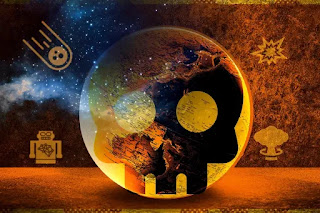Existential Risk Probability Analysis Will humanity survive the 21st century or more appropriate will be to ask : is it possible to lower the effect of human Madness to the extent where we can live peacefully? well, it Seems to be a big conundrum. But, the more arduous it is, the more cardinal it is to reach some answer via inference and research because then only there will be some possibility to cope it.
In order to reach some clarity, we need to cover some integral aspect so to be able to see all the facets.
Initially, what is a global catastrophic risk? It is a hypothetical future event with could damage human well being on a global scale and an event that could cause human extinction permanently and may drastically curtail Humanity's potential is something we call existential risk.
Basically, existential risk is the probability of the intensity of risk on human existence.
Now, The potential catastrophic risks includes multitude of different types of risk that may become the nightmare for the humanity. But, for the convenience of understanding, we can classify these risks into two major categories: anthropogenic and non-anthropogenic. Anthropogenic risks are those which are caused by humans and their mindless activities such as horrendous technology, paranoid governance , climate change based on human activities, etc and non-anthropogenic risks are the external risks.
The dichotomy between between anthropogenic and non-anthropogenic risk is quite remarkable, why! It is because the modern technology like that of super-intelligent Artificial intelligence, molecular nano-technology weapons , nuclear war, etc are incontestable with the non-anthropogenic one in terms of damage.
A global catastrophic risk is any risk that is at least global in scope, and is not subjectively imperceptible in intensity. Those that will affect all future generations and are "terminal" in intensity are classified as existential risks. While a global catastrophic risk may kill the vast majority of life on earth, humanity could still potentially recover. An existential risk, on the other hand, is one that either destroys humanity entirely or prevents any chance of civilization's recovery.
There are numerous factors that must be studied consciously and absolute clarity of perception is cardinal before making any conclusion which we will surge in the subsequent parts.
In this part lets visits some prevalent hypothesis about our fate.(Wish I am wrong)
1) Martin Rees is Britain’s astronomer royal, a professor at Cambridge University, and one of the leading cosmologists in the world. In a 2003 book, titled Our Final Hour, he gave civilization a 50-50 chance of surviving the 21st century, an estimate he reached after surveying all the ways humanity could destroy itself.
2) Now consider this: In October, a separate team from Oxford published its own paper on human extinction in the journal Scientific Reports — and it found that people don’t seem to see the loss of humanity as uniquely tragic.
The second group of researchers asked more than 2,500 people in the United States and the United Kingdom to rank three possible scenarios from best to worst: no major catastrophe, a catastrophe that wipes out 80 percent of the human population, and a catastrophe that causes complete human extinction.
3)Forget nuclear weapon, biological warfare, and the slew of other ways humanity could cause its own destruction for a moment.
If you take into account only naturally occurring phenomena — super volcanic eruptions, asteroid impacts, and the like — researchers from the University of Oxford recently determined that the probability of our entire species going extinct in any given year could be as high as one in 14,000 (although it's probably closer to 1 in 87,000).
4)A new study found that the ongoing mass extinction on Earth has been accelerating. Researchers said that human activities mainly contribute to the rapid loss of life and that a global effort is now needed to address the phenomenon.
The study, published in the journal PNAS, states that with the current pace of mass extinction, it may take just decades for hundreds more species to disappear for all time. It also warned that the rapid loss of species may damage ecosystems and food webs, affecting the survival of both animals and humans.
5)The 2016 annual report by the Global Challenges Foundation estimates that an average American is more than five times more likely to die during a human-extinction event than in a car crash
The end of civilisation and human extinction are distasteful topics. Nobody likes discussing them and many people prefer to ignore them as they go about their daily lives. But ignoring them does not vanish the risk – inevitably, it only renders humanity less prepared, our future more perilous. There is no other way to deal with such a complex problem than to face up to it, to understand it thoroughly, and to then take resolute and agreed species-wide action to prevent it.
And, so we need to get acquainted more with such other factors to have a liberal point of view, which we try to inculcate in the later parts.
Just to get some sense of scenario, I am leaving you people with the possible risk probability speculated in 2003!
| risk | Estimated probability for human extinction before 2100 | |
| overall probability | 19% | |
| molecular nano-technology weapon | 5% | |
| super-intelligent AI | 5% | |
| All wars | 4% | |
| engineered pendamic | 2% | |
| nuclear war | 1% | |
| nano-technology accident | 0.5% | |
| natural clamities | 0.05% |





No comments:
Post a Comment